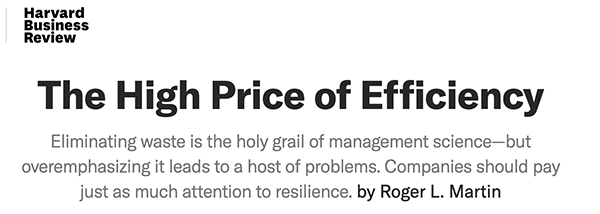
There are a lot of great posts buried in this blog’s archives that are still quite apt. Today is another reprise, this time revisiting the (often invisible) tradeoff between efficiency and resilience.
Last time I explained that tradeoff with the case study of electricity blackouts in Texas and how that related to Google’s monopoly on search and Amazon’s dominance of eCommerce. If you take a step back and look at the business news, most of those stories are commending efficiency with only rare mention of resilience.
Take every merger and acquisition story. Every single one of those stories will tout the possible synergies and efficiencies, with the only resiliency ever mentioned is when the two companies are both in the top 5 of their industry, with worries about monopoly pricing or large numbers of layoffs. I’ve never seen a business merger story that asks whether the merged company will be better able to serve customers upon the next downturn.
What society fails to notice is that every optimization toward efficiency is a tradeoff in optimizing for resiliency. Resiliency being the ability for a company (or any organization) to survive a future different from today. In business that can be a downturn in sales or a change in competition or a change in fashion or behavior by customers. Or a macroeconomic shock or war or weather.
This is akin to Darwin’s theory of natural selection. Panda’s only eat bamboo. Koalas only eat eucalyptus. Baleen whales eat only krill. They have optimized their diets based on a world where those food sources are in abundance. Change the climate and those animals can starve. As opposed to millions of other species that eat more than one food and are far more resilient to changes in food sources.
The business world has similar optimizers. There are dozens of companies in the United States who only sell products and services to the U.S. government. I had a startup which only sold to the Fortune 500, leaving us just 500 (or so) potential customers. My next startup only sold to mobile phone operations, leaving us just 5 or 6 potential customers in the U.S., 3 in Canada, and only a dozen (or so) more in Europe.
For all of us who survived 2020, a key lesson is that the world can change, and change quickly. If we are to expect the unexpected then we need to stop solely optimizing for efficiency and leave some resilience in our systems.















